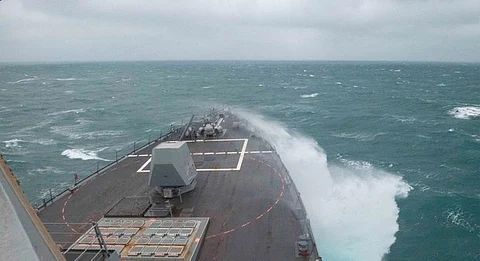
- Home
- न्यूजग्राम
- NewsGram USA
- India
- World
- Politics
- Entertainment
- Culture
- Lifestyle
- Economy
- Sports
- Sp. Coverage
- Misc.
- NewsGram Exclusive
- Jobs / Internships

The Arleigh Burke-class guided-missile destroyer USS Chung-Hoon (DDG 93) sails through the Taiwan Strait on Jan. 5, 2022.
A U.S. naval ship made another “routine” Taiwan Strait transit Thursday, drawing criticism from China which said the exercise would “escalate tensions” in the region.
The U.S. Navy’s 7th Fleet said in a statement that its Arleigh Burke-class guided-missile destroyer USS Chung-Hoon sailed through the waters between Taiwan and the Chinese mainland, “where high-seas freedoms of navigation and overflight apply in accordance with international law,” on Jan. 5.
“The ship transited through a corridor in the Strait that is beyond the territorial sea of any coastal State,” the statement said, adding that the passage “demonstrates the United States’ commitment to a free and open Indo-Pacific.”
It took place exactly two months after another 7th Fleet destroyer, the USS Benfold, made a similar trip.
Taiwan’s Ministry of National Defense confirmed the transit, saying the Chung-Hoon “passed through the Taiwan Strait from south to north,” and the “situation in the surrounding sea and airspace was normal.”
USS Chung-Hoon is part of the Nimitz Carrier Strike Group, currently in the 7th Fleet conducting routine operations in the Philippine Sea.
China reacted angrily, with a spokesman for the Chinese embassy in Washington D.C. condemning the move.
Minister-counselor Liu Pengyu said in a statement that China “firmly opposed” the transit and “urged the United States to immediately stop moves that would provoke trouble, escalate tensions and destabilize the Taiwan Strait.”
“U.S. warships often flex their muscles in the name of freedom of navigation, which is not for freedom and openness,” the statement said.
Liu added that China “will continue to maintain high vigilance, respond to any threats and provocations at any time.”
Meanwhile, the Chinese military said it “fully monitored, tracked and maintained high alert for U.S. missile destroyer USS Chung-Hoon transiting through the Taiwan Strait,” according to a statement from the People’s Liberation Army (PLA) Eastern Theater Command.
The U.S. Navy’s ships in recent years have made regular transits through the Taiwan Strait despite protests from Beijing.
China considers Taiwan one of its provinces and says it has “sovereignty, sovereign rights and jurisdiction over the Taiwan Strait.”
Beijing argues that the Strait is Chinese territorial waters and demands that foreign warships give prior notice of passage.
The U.S., for its part, considers the Taiwan Strait international waters and insists on the so-called “innocent passage” rule that grants freedoms of navigation “in accordance with international law.”
The 7th Fleet said in its statement on Jan. 5: “The United States military flies, sails and operates anywhere international law allows.”
Thursday’s Taiwan Strait passage is the first this year. Public statistics show that U.S. warships have transited the Taiwan Strait about once a month since 2020, making the practice a “new normal.”
In a related development, U.S. Secretary of State Antony Blinken during his upcoming visit to Beijing will discuss the South China Sea with Chinese officials, a State Department spokesman said.
Topics may include artificial island buildups and militarization, as well as China’s “coercion and intimidation along with other provocative actions,” Ned Price told a press briefing on Thursday.
According to the spokesman, China’s “activities in the South China Sea are a regular topic of discussion, including with our allies and partners in the Indo-Pacific, but also with PRC authorities themselves.”
Price referred to China by its official name, the People’s Republic of China (PRC).
“Beijing has offered no coherent legal basis for its expansive maritime claims in the South China Sea,” he said, adding that Beijing “is interfering in the navigational rights and freedoms that have accrued to all states.” (SJ/RFA)
